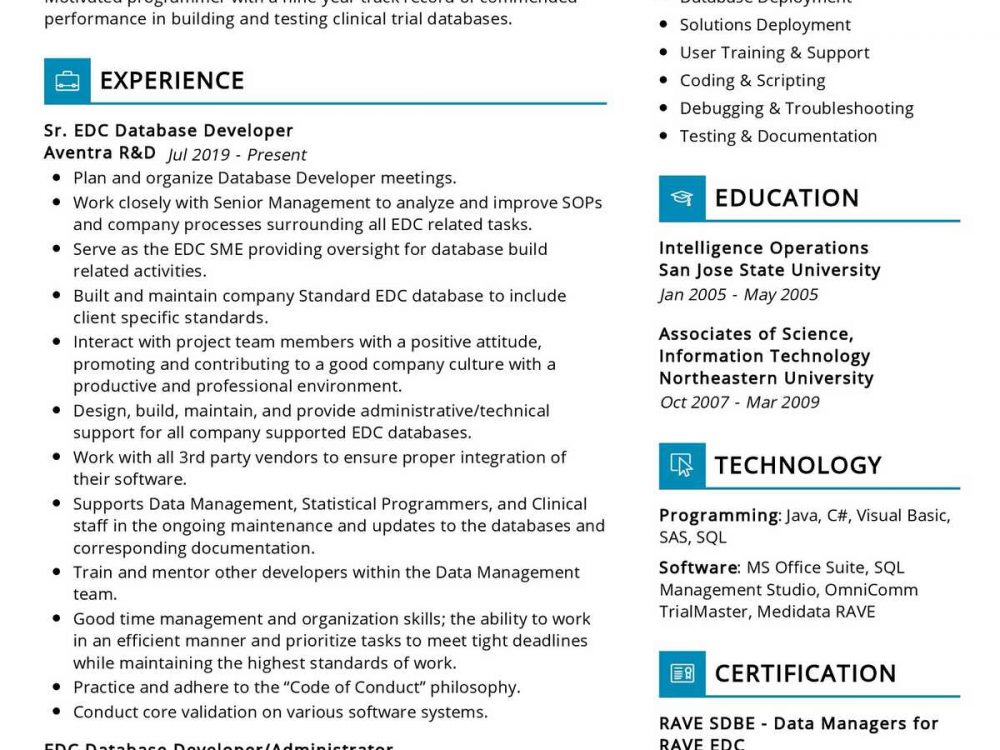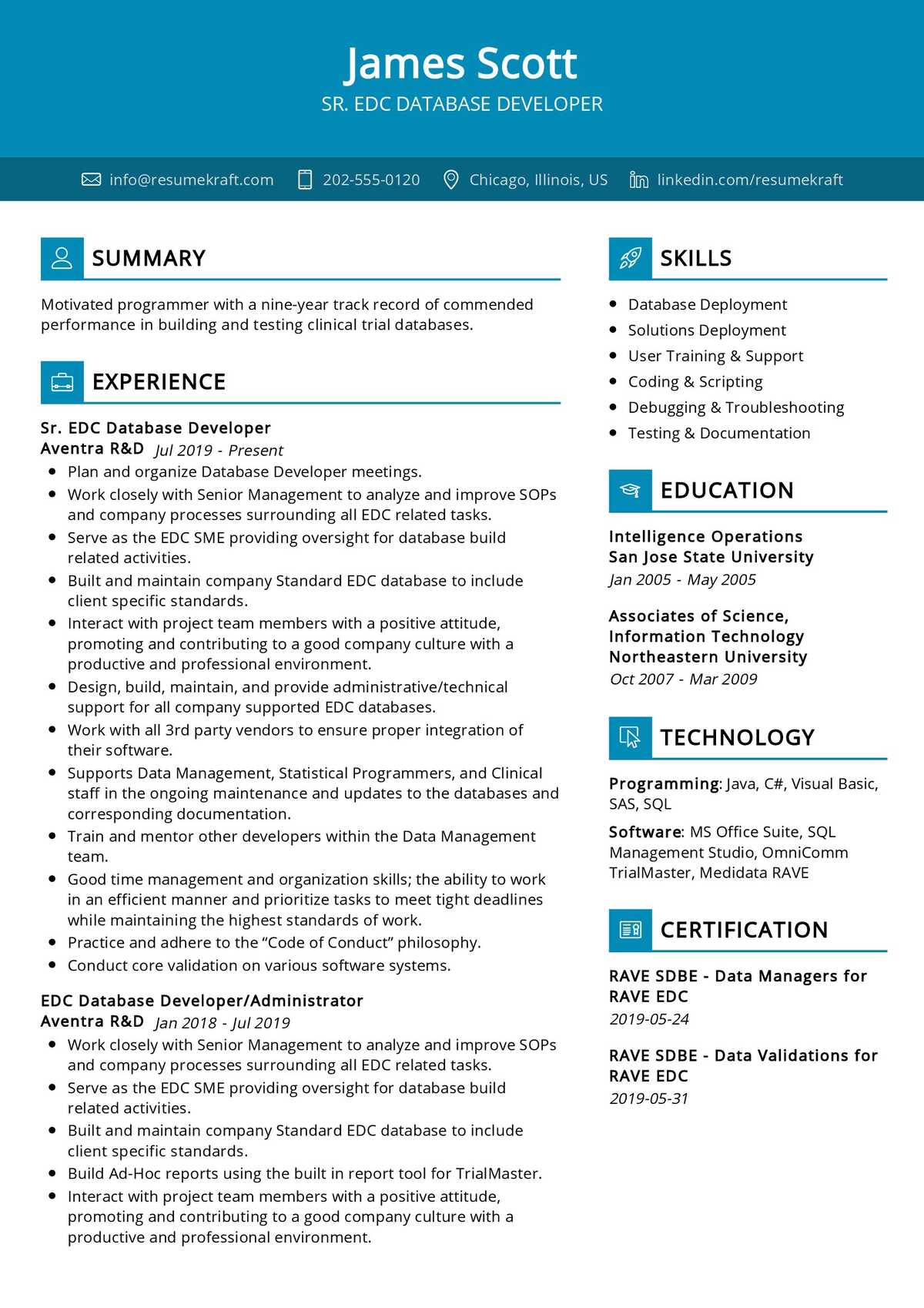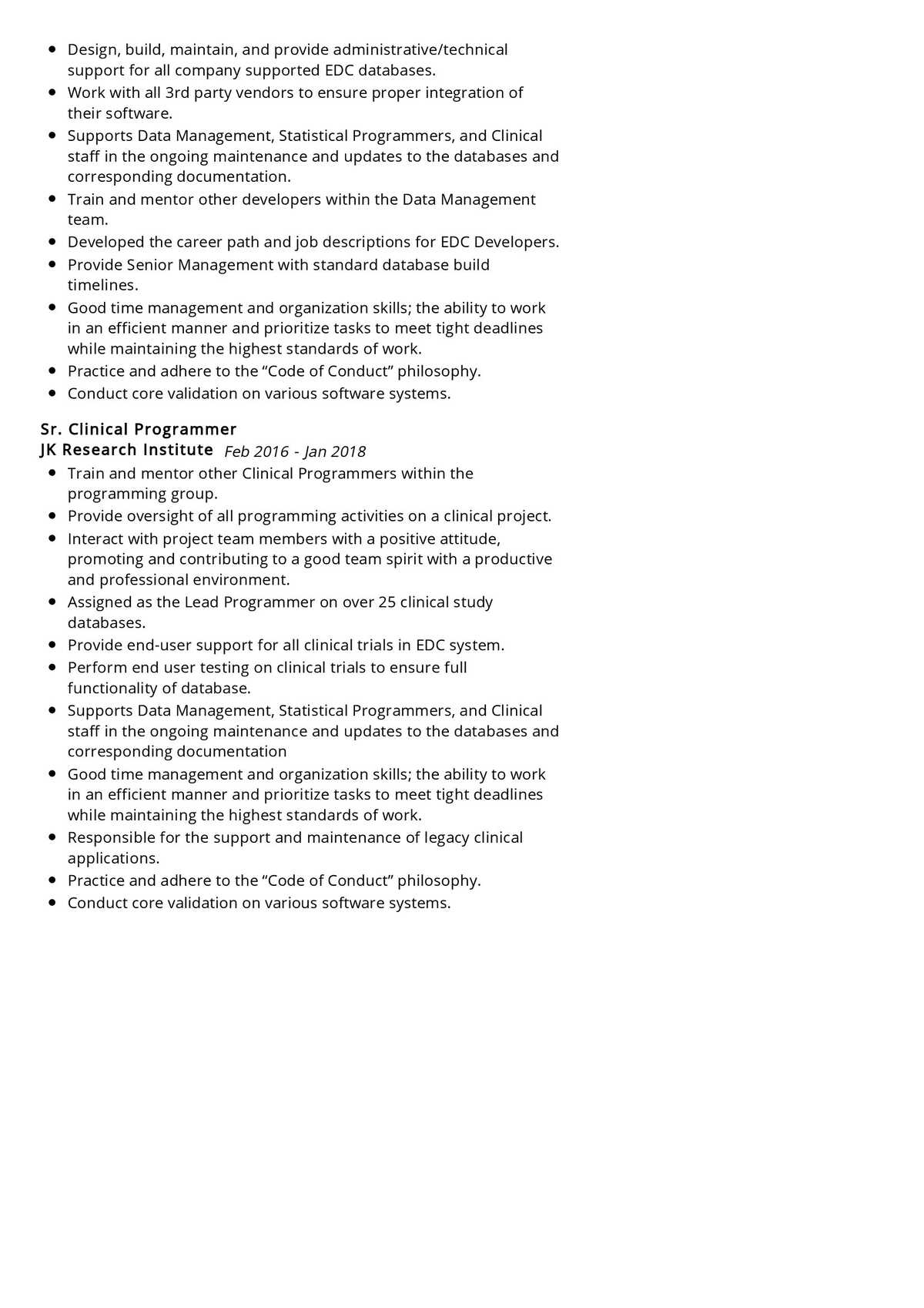Are you an EDC Database by profession and looking for an exciting career? We have good news for you! use our professional Senior EDC Database Resume Sample. You don’t have to start writing from scratch. Just click “Edit Resume” and modify it with your details. Update the template fonts and colors to have the best chance of landing your dream job. Find more resume samples.
Career Expert Tips:
- Always make sure you choose the perfect resume format to suit your professional experience.
- Ensure that you know how to write a resume in a way that highlights your competencies.
- Check the expert curated popular good CV and resume examples
Effective Tips to Write a Database Developer Resume
Are you seeking a new career as a Database Developer? It’s understandable that you want the best possible job opportunity. To help your chances of success, follow this guide for tips on how you can write your resume and cover letter so that they are targeted to the specific position.
First, Pay Attention to the Job Description!
A lot of job seekers don’t seem to pay much attention to the job description when they write their resumes and cover letters. You should pay attention to the requirements of the job posting, though. If there is a specific format that you should follow, make sure that you follow those directions as closely as possible.
Remember: There’s definitely a reason why the job posting is asking for specific information. They want to make sure that they are finding the best candidate for the job. Make sure that you’re clearly presenting yourself as that candidate!
Database Developer Job Responsibilities:
- Design and develop high-quality database applications, using the latest technologies.
- Provide database experts with superior technical support for their applications.
- Manage database development projects, including workflows and timelines.
- Identify, prioritize and resolve problems regarding client requests, project challenges and database development issues.
- Work with developers to review code for correctness as well as consistency of style and code formatting to ensure that the project is completed according to project plans.* Support specific technology needs of client projects including SQL server environments.
- Regularly evaluate and improve upon processes, tools and skills.
- Work closely with management, other project managers and QA staff to ensure a high quality of work products.
- Work within formal quality control processes to ensure accuracy and consistency of work products.
- Perform other duties as assigned.
Top 10 Must-have Database Developer Skills:
- Database Design and Development:
Having a good grasp of the concepts that lie behind database design will help you to be a successful developer. You should understand the principles behind hierarchy, data management, normalization and dimensional storage, and how each affects application design. - Expertise with databases:
Relevant skills include an understanding of SQL, JDBC, ODBC and XML. Experience should include working at least one of Oracle or MySQL. - Experience with Database Tools:
From tools as simple as spreadsheets to complex project management software, you should be able to work within the limits of database-driven projects. You’ll need a working knowledge of such tools as SQL Server, Oracle, MySQL and Access. It’s best if you’ve used these to analyze and monitor development projects, and even worked with them in a consulting capacity. - Database Design:
You should be familiar with database design concepts, including ER diagrams, table relationships, and database implementation. A thorough understanding of the fundamental principles that underlie relational database theory is essential. - Experience with the SQL language:
While you can do without it in entry level positions, you will need excellent SQL programming skills to advance in the field. You should know how to use SQL to create and manage tables, data entry forms, column structures and other components that are key to database management. - Database Design:
You’ll need to be familiar with database design concepts, including ER diagrams, table relationships, and database implementation. A thorough understanding of the fundamental principles that underlie relational database theory is essential. - Expertise with Object-relational Modeling (ORM):
This is a popular approach for creating applications that use several different databases and servers in the same way as one giant application. You should use SQL Server and have experience with both networked solutions and deployment issues. - Expertise with SQL Server:
A good database designer can work with either a flat-file or relational database management system. You should be able to work with just about any relational system, including Oracle and MySQL. You’ll need to have a good working knowledge of SQL Server, including basic syntax, databases and administration, as well as advanced database concepts and techniques. - Experience with Windows and UNIX:
You should be familiar with how to use the command-line interface and understand the concepts involved in programming with files, including logging, file-locking, and other areas. - Solid Knowledge of Database Concepts:
Database design is an essential skill for database administrators. You should have a solid understanding of relational database management systems as this will help you to write efficient program code for the retrieval, storage, and maintenance of data.
Tips to write a Database Developer Resume with no experience:
Here are some tips to make your first Database Developer resume look impressive and ready-to-be an excellent resume for a Database Developer job.
- First of all, the resume is intended to highlight your professional experiences that have contributed to your career development. Make sure that the resume highlights accomplishments and skills you are proud of.
- What is your education and training? Explain how these activities have helped mold you into a professionally capable person. Say why you feel you are qualified for this position in detail.
- List the education and training programs you have completed. You should list the degree at the top of each section in bold text. If you have special certifications, accomplishments, or experience that is in addition to your degree; include this information in a bulleted format under those sections.
- List your professional affiliations and community involvement in which you feel proficient as this will give an idea about your capabilities and how you can work with others for a mutual benefit.
- Your resume should be professionally written and easy to read. Use action words that will highlight your experience and skills. Start each section with an action word or phrase such as “Managed,” “Designed” etc. Do not use too many phrases on your resume because you may end up using too many words, which makes the resume look cluttered.
Tips to write a Database Developer Cover Letter:
Here is a guide to writing a good Database Developer cover letter.
- The cover letter should indicate that you are an expert in the field and will be able to successfully handle the job responsibilities.
- The resume should be addressed to the correct person rather than only being sent to HR or the company website. You can customize it for different companies or organizations depending upon your experience, technical competence and skills needed for the job position you are applying for.
- You may also want to include any relevant background information about yourself in your cover letter.
- You should write the letter in a professional and concise manner, which is easy to read and understand.
- You should also provide references that can verify the skills and experience that you have mentioned in your resume as this will help the hiring manager evaluate how well you can perform the job tasks.
- Always proofread your cover letter before sending it to the employer for final review.
Conclusion:
When you are done, you should be able to create a Database Developer Resume that stands out from other resumes!



